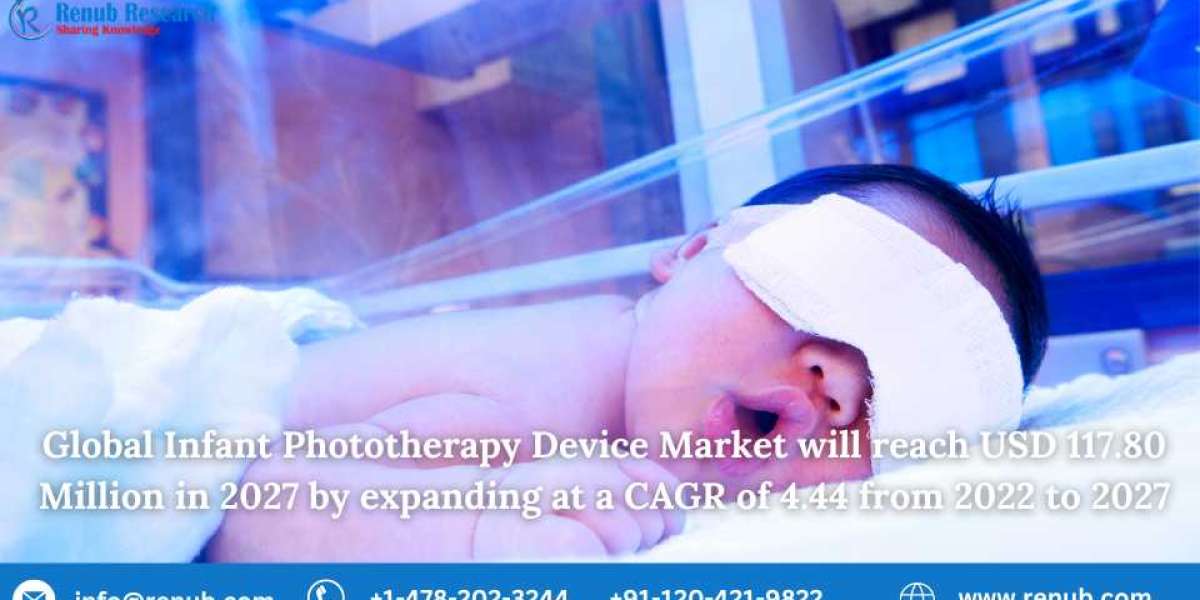Renub Research latest report, “Infant Phototherapy Market, Global Forecast 2023-2027, Industry Trends, Growth, Impact of Inflation, Opportunity Company Analysis” Infant Phototherapy Market was US$ 94.82 Million in 2022. Infant phototherapy is a non-invasive and safe clinical therapy that utilizes specific wavelengths of light to reduce high levels of bilirubin in the blood of newborns with neonatal jaundice. The National Collaborating Centre for Women’s and Children’s Health in the UK estimates that jaundice is among the most prevalent conditions that require medical attention in new-borns. The report also states that around 60% of term babies and over 80% of preterm babies develop jaundice in their first week of life, and about 10% of breastfed babies are still jaundiced after one month age.
Expert Insights: Ask Analyst or Download Full Report with TOC Figures: https://www.renub.com/infant-phototherapy-device-market-p.php
Phototherapy is a highly effective and straightforward technique that can be employed to treat neonatal jaundice in infants. This method is commonly utilized to reduce levels of bilirubin, which is the compound responsible for causing jaundice in newborns. It does not require invasive medical equipment and has minimal, mild, and short-lived side effects. In addition, the treatment can be performed at the baby’s bedside, allowing the infant to stay close to their family. Moreover, it is relatively affordable compared to other medical interventions and can help prevent the need for more invasive and expensive treatments.
The growth of the infant phototherapy market is due to several factors, including the increasing incidence of neonatal jaundice, the rising demand for non-invasive and effective treatment options, the availability of advanced phototherapy systems, and the growing awareness among healthcare professionals and parents about the benefits of phototherapy for the treatment of neonatal jaundice. Additionally, the increasing healthcare expenditure and improvements in healthcare infrastructure in developing countries will further boost the growth of the infant phototherapy market.
Quartz Halogen Lamps ‘effectiveness in treating newborns’ Jaundice has led to its Growth
Quartz Halogen lamps emit high-intensity light in the blue-green spectrum, breaking down bilirubin in the baby’s blood. In addition, these lamps have a longer lifespan and are more energy-efficient than traditional phototherapy lamps. The increasing prevalence of jaundice in newborns and the growing demand for safe and effective treatment options can also contribute to the growth of the quartz halogen lamp market for newborn phototherapy.
Mobile Device Configuration has Hegemony in the Infant Phototherapy Market
The dominance of mobile devices configuration in infant phototherapy can be attributed to their portability and ease of use, allowing healthcare providers to administer the treatment directly at the infant’s bedside, eliminating the need for transferring the baby to a separate treatment area, and allowing for closer monitoring during the therapy session. Mobile devices also offer flexibility in adjusting the light intensity and duration of the therapy to meet the specific needs of each infant.
Consequently, early detection and Treatment of Neonatal Jaundice upsurged the need for Neonatal Clinics
Trained medical professionals with advanced medical technology can monitor and treat newborns with jaundice more effectively in neonatal clinics. Additionally, neonatal clinics provide specialized care and support for premature infants at a higher risk of developing jaundice and other medical conditions. The growth of neonatal clinics is also driven by the increasing demand for advanced neonatal care and facilities, particularly in developing countries with high neonatal mortality rates.
Asia-Pacific will register Significant Growth in the Coming Years
The World Health Organization (WHO) reports India’s infant mortality rate in 2022 was 27.69/1000 deaths for every live birth, a 3.74% decrease from 2021.The rapid growth rate has been linked to an increase in the number of pre-term births and individuals experiencing skin disorders. The Lancet reports that approximately 85% of pre-term births occur during the late preterm period, with 80% of these births taking place in Asia and South Asia. Moreover, Narayan Health Organization states that out of the 15 million pre-term births worldwide, one-fifth of these births occur in India alone. In addition, individuals in the Asia Pacific region are more susceptible to acne, which is expected to drive the demand for phototherapy equipment. The Derma Health Institute notes that acne is a common condition among people of Asian ethnicity, thus fueling the growth of the phototherapy equipment market in this area.
Request a free sample copy of the report: https://www.renub.com/request-sample-page.php?gturl=infant-phototherapy-device-market-p.php
Competitive Landscape
The infant phototherapy industry is highly competitive due to many factors, such as many players with similar products and services, new entrants, and innovative technologies. In addition, companies compete for cost-effective treatment solutions, robust distribution networks, and partnerships with healthcare facilities. Also, the demand for advanced phototherapy devices and awareness of neonatal jaundice treatment intensifies the competition.
Some major companies operating in the market are Koninklijke Philips N.V, Natus Medical Incorporated, Ningbo David Medical Device Co., Ltd, Becton, Dickson, and Company, Inspiration Healthcare Group Plc., Atom Medical Corporation, Drägerwerk AG Co. KGaA, and Nihon Kohden.
Market Summary:
- Type – The Report covers Global Infant Phototherapy Market, by type in 4 viewpoints (Light Emitting Diodes (LED), Fluorescent Lamps (FL), Quartz Halogen Lamps, and Gas Discharge Tubes).
- Configuration – Global Infant Phototherapy Market, by configuration, breakup in 2 viewpoints (mobile devices and fixed devices).
- End-User – The Report covers Global Infant Phototherapy Market, by end-user in 2 viewpoints (hospitals and neonatal clinics).
- Region – By region, the Global Infant Phototherapy Market, breakup in 6 viewpoints (Europe, North America, Asia-Pacific, and the Rest of the World).
- Key Players– All the major players have been covered from 3 Viewpoints (Overview, Recent Developments, and Revenue) Johnson Controls Revenue, Schneider Electric, Emerson Electric Revenue, LG, LeGrand, Siemens AG, Honeywell, and Apple.
Related Reports
Prefilled Syringes Market, Global Forecast 2023-2029
Telemedicine Market, Global Forecast 2023-2028
Hip Replacement Market, Global Forecast 2023-2028
Orthopedic Prosthetic Market, Global Forecast 2023-2028
Colonoscopy Devices Market Global Forecast 2023-2027
About the Company:
Renub Research is a Market Research and Information Analysis company with more than 14 years of experience in Research, Survey, and Consulting. Our research helps companies to take business decisions: on strategy, organization, operations, technology, mergers acquisitions, etc. Till now we have published more than 7000 syndicated reports and worked on more than 500 custom research projects. Currently, we are supplying data to EMIS, Bloomberg, Thomson Reuters, etc. We support many blue-chip companies by providing them with findings and perspectives across a wide range of markets.
Media Contact:
Company Name: Renub Research
Contact Person: Rajat Gupta, Marketing Manager
Phone No: +1-478-202-3244 | +91-120-421-9822 (IND)
Address: 225 Kristie Ln, Roswell, GA 30076
Email: info@renub.com
LinkedIn: https://in.linkedin.com/company/renub-research
Web: www.renub.com




david francis 41 میں
The infant phototherapy device market is experiencing significant growth, driven by increasing neonatal care awareness and advancements in technology. clipping path image editing service Forecasts indicate a rise in market share due to the growing incidence of jaundice in newborns and enhanced healthcare infrastructure. Innovations in device design and effectiveness are expected to further boost adoption, ensuring improved outcomes for infants worldwide.